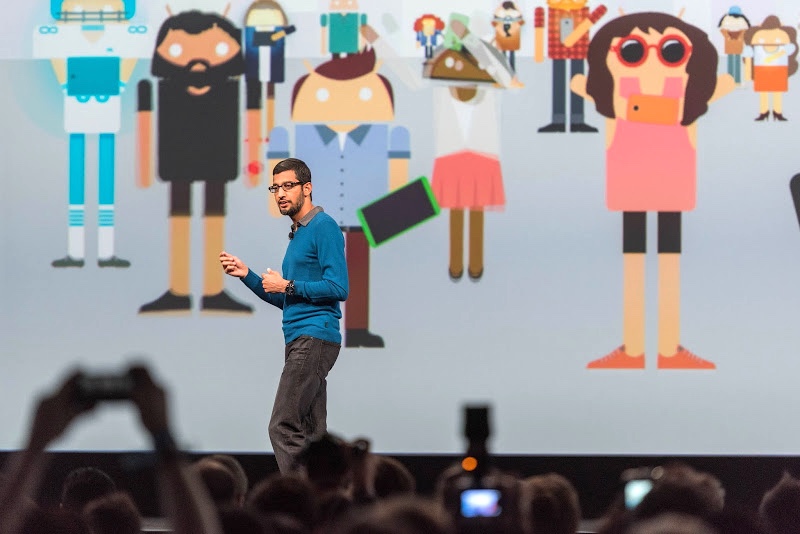- Home
- Mobiles
- Mobiles News
- Apple's Battle With FBI Underscores Android's Poor State of Encryption: Report
Apple's Battle With FBI Underscores Android's Poor State of Encryption: Report

Google CEO Sundar Pichai last month backed Apple in its ongoing fight with FBI over encryption. While privacy advocates welcomed Pichai's stand on supporting Apple, they are still concerned about the poor state of encryption on Android devices. According to estimates, fewer than 10 percent of Android phones are encrypted.
If San Bernardino shooter Syed Rizwan Farook was using an Android phone, FBI may have closed the case within hours without much assistance from Google. The reason is simple: most Android phones aren't as secure as an iPhone.
In fact, according to an investigator for France's Gendarmerie Nationale, the specialised software that authorities use to crack passcodes will only take about an hour to crack a locked, but unencrypted, Android phone.
According to experts cited in a Wall Street Journal report, fewer than 10 percent of 1.4 billion Android phones are encrypted. This, when compared to iPhone's 95 percent adoption rate, seems alarmingly low. The reason why most Android phones aren't encrypted resides in how they are manufactured and sold.
The long-debated fragmentation issue is still crippling Android ecosystem. When more than 400 manufacturers build Android phones, their preference and commitment towards issuing updates play a major role in exactly how soon -- if at all - their customers will have a certain feature.
According to the Manhattan district attorney, cited in the report, investigators can bypass passcodes on some older Android devices. And Google can remotely reset passcodes on others.
Google is taking steps, albeit very slowly, to improve security on Android. To recall, Google introduced full-disk encryption with Android 5.0 Lollipop, but ultimately didn't make it mandatory for all manufacturers to enable the encryption by default. The company had initially promised it would be enabled by default, responding to increased device encryption introduced by Apple in iOS 8. It wasn't until last year (and Android 6.0 Marshmallow) that Google made it mandatory for its OEMs to enable the feature by default.
For the latest tech news and reviews, follow Gadgets 360 on X, Facebook, WhatsApp, Threads and Google News. For the latest videos on gadgets and tech, subscribe to our YouTube channel. If you want to know everything about top influencers, follow our in-house Who'sThat360 on Instagram and YouTube.
Related Stories
- Galaxy S24 Series
- MWC 2024
- Apple Vision Pro
- Oneplus 12
- iPhone 14
- Apple iPhone 15
- OnePlus Nord CE 3 Lite 5G
- iPhone 13
- Xiaomi 14 Pro
- Oppo Find N3
- Tecno Spark Go (2023)
- Realme V30
- Best Phones Under 25000
- Samsung Galaxy S24 Series
- Cryptocurrency
- iQoo 12
- Samsung Galaxy S24 Ultra
- Giottus
- Samsung Galaxy Z Flip 5
- Apple 'Scary Fast'
- Housefull 5
- GoPro Hero 12 Black Review
- Invincible Season 2
- JioGlass
- HD Ready TV
- Laptop Under 50000
- Smartwatch Under 10000
- Latest Mobile Phones
- Compare Phones
- Huawei Pura 70 Pro
- Huawei Pura 70
- Vivo V30e
- Itel Super Guru 4G
- Huawei Pura 70 Pro+
- Huawei Pura 70 Ultra
- Tecno Camon 30 Premier 5G
- Motorola Edge 50 Fusion
- Asus ZenBook Duo 2024 (UX8406)
- Dell Inspiron 14 Plus
- Realme Pad 2 Wi-Fi
- Redmi Pad Pro
- Cult Shock X
- Fire-Boltt Oracle
- Samsung Samsung Neo QLED 8K Smart TV QN800D
- Samsung Neo QLED 4K Smart TV (QN90D)
- Sony PlayStation 5 Slim Digital Edition
- Sony PlayStation 5 Slim
- Voltas 1.5 Ton 3 Star Split AC (183 Vectra Elegant 4503545)
- Hitachi 1.5 Ton 5 Star Inverter Split AC (RAS.G518PCBISF)
















